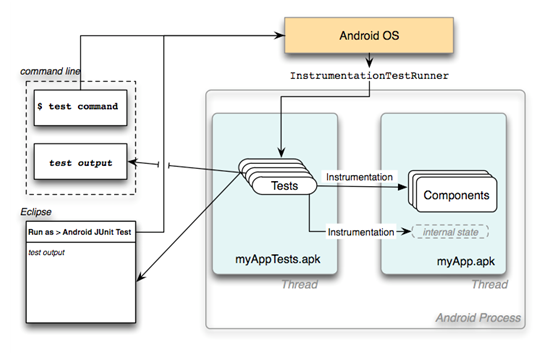Instrumentation
Instrumentation直接的说是安卓源码里的一个类,在启动app的时候都会实例化一个Instrumentation对象,主要有2个作用:
- 在activity跳转的时候,其内部类ActivityMonitor会监控activity的加载
- activity的生命周期的触发也是通过它来调用的
对应用开发人员,Instrumentation的作用更多的是在自动化测试上。
自动化测试
自动化测试不是直接使用Instrumentation,而是使用它的子类InstrumentationTestRunner或AndroidJUnitRunner。
方式是在AndroidManiFest.xml里面配置:
<instrumentation
android:name="android.test.InstrumentationTestRunner"
android:label="InstrumentationApp"
android:targetPackage="com.instrumentation.app" >
</instrumentation>
如果是AS里,通过gradel配置更为方便:
defaultConfig {
testInstrumentationRunner "android.support.test.runner.AndroidJUnitRunner"
}
app正常的启动使用的是默认的Instrumentation的对象,在Activity类中其实是持有改对象的,通过反射的方式是可以看出来的:
Field mInstrumentation;
Object value = null;
try {
mInstrumentation = Activity.class.getDeclaredField("mInstrumentation");
mInstrumentation.setAccessible(true);
value = mInstrumentation.get(this);
} catch (NoSuchFieldException e) {
e.printStackTrace();
} catch (IllegalAccessException e) {
e.printStackTrace();
} catch (IllegalArgumentException e) {
e.printStackTrace();
}
Log.e("111", "Instrumentation: "+value.getClass().getName()); // Instrumentation: android.app.Instrumentation
自动化测试基本原理
Instrumentation框架下,测试应用程序可以精确控制应用程序。Instrumentation框架通过将主程序和测试程序运行在同一个进程来实现这些功能。
